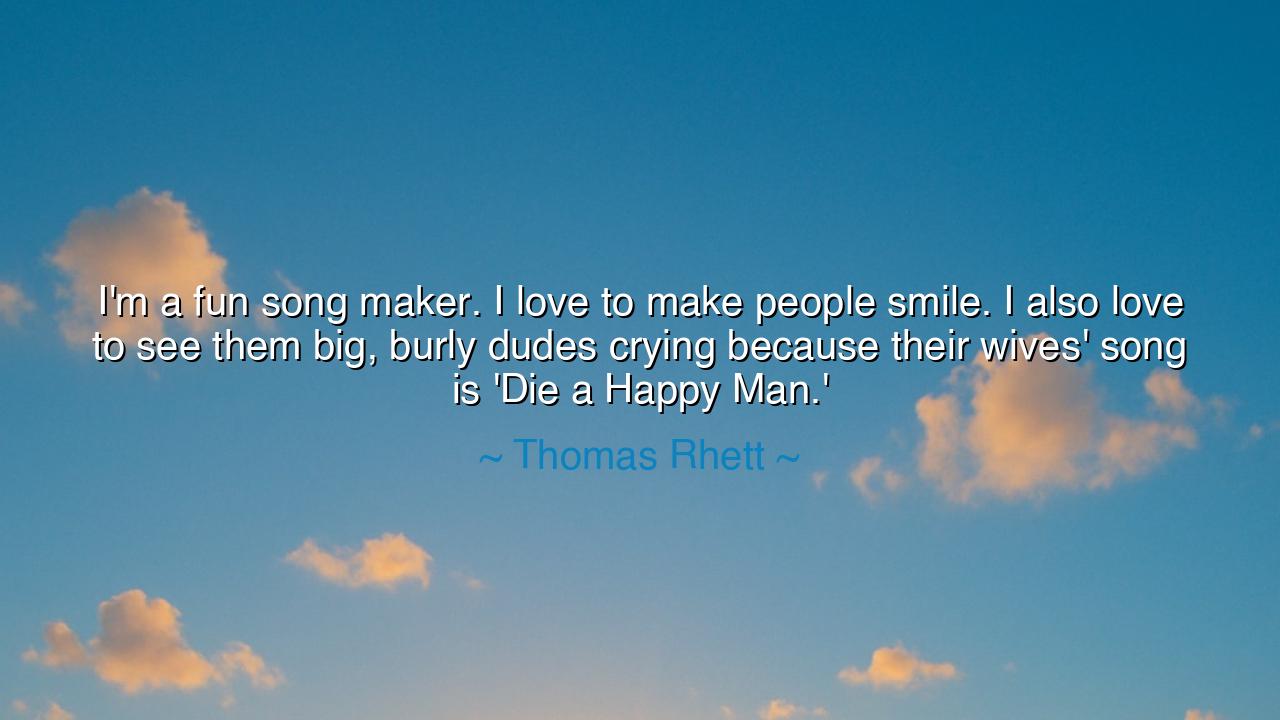
I'm a fun song maker. I love to make people smile. I also love to
I'm a fun song maker. I love to make people smile. I also love to see them big, burly dudes crying because their wives' song is 'Die a Happy Man.'






Thomas Rhett, with the candor of a minstrel who knows the true weight of his art, once said: “I’m a fun song maker. I love to make people smile. I also love to see them big, burly dudes crying because their wives’ song is ‘Die a Happy Man.’” In this playful confession rests a profound truth: that music has the power to pierce through the strongest armor, to move both the gentle and the mighty, and to awaken in every soul the deep currents of love and longing. For the song is not merely sound, but a vessel of memory, emotion, and truth.
The ancients themselves would have bowed their heads at these words. For long before the written word, there was the song. Homer’s Iliad and Odyssey were sung to stir courage, to keep alive the memory of heroes. The psalms of David were sung to heal wounded hearts, to give voice to the inexpressible. Thomas Rhett’s declaration stands in this same stream: he is not merely a maker of tunes, but a bringer of laughter and tears, a weaver of emotions that unite both the tender and the rugged.
Notice how he delights in contradiction—the “big, burly dudes” brought to tears by a love song. This is no accident. It is proof that true art shatters the walls we build around our hearts. The soldier, the laborer, the stoic man of strength—each may resist words, reason, or persuasion, but the melody of love can move him. What arguments cannot achieve, a simple song may accomplish, humbling the strong and lifting the weary. Rhett smiles at this miracle, for it reveals the hidden humanity in us all.
History bears witness to this. Consider the case of Henry V before the Battle of Agincourt. Shakespeare’s play imagines him speaking words that became immortal—“we few, we happy few, we band of brothers.” These words, though not sung, carried the cadence of a song, and they stirred men to face impossible odds. Or recall the hymns sung in secret during the civil rights movement—melodies like “We Shall Overcome” that gave courage to marchers as they faced violence and oppression. In both times and places, it was the rhythm, the melody, the spirit of the song that gave strength and opened hearts.
The deeper lesson in Rhett’s words is that joy and sorrow are not opposites, but companions. The smile and the tear belong together, and the greatest songs summon both. To make people smile is a gift; to make them weep for love is a greater gift still, for it means the music has touched their soul’s core. In this way, the song maker becomes more than an entertainer—he becomes a healer, a revealer of truth, a guide into the heart’s hidden chambers.
Practical wisdom springs forth: seek to live in such a way that your words, your actions, your work become like a song. Let them carry lightness to bring smiles, and depth to stir the hidden tears of compassion and love. Do not be afraid to show both sides of humanity, for to laugh without ever weeping is shallow, and to weep without ever laughing is despair. The fullness of life is found in both, and the artist—or the soul—that can summon both has given the world a great gift.
Therefore, O listener, take this teaching as your own: whether you craft music, raise children, labor in fields, or lead nations, let your life be a song that leaves others changed. Be as Thomas Rhett described—a maker of joy, a bringer of smiles, but also one who awakens the tears that prove love still dwells within even the hardest hearts. For in those smiles and in those tears, humanity is most alive, and your true legacy is born.






AAdministratorAdministrator
Welcome, honored guests. Please leave a comment, we will respond soon